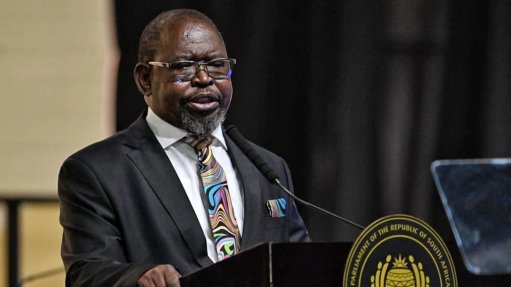Blockchain will have big impact on electricity sector, KPMG asserts
A number of new technology develop- ments are expected to impact on the global electricity sector, including virtual and augmented reality, artificial intelligence, Big Data and the Internet of Things (IoT); however, tax, audit and advisory firm KPMG South Africa senior manager Nevellan Moodley says that blockchain is likely to have the most significant effect on the industry.
Blockchain technology refers to a distributed network that is used to manage a growing list of individual records or blocks, each with a unique identification code.
Local solar cell crowd-selling company The Sun Exchange is highlighted by Moodley as a “fantastic example of the potential of blockchain” in the electricity sector.
The Sun Exchange divides solar panels into individual cells or blocks which are then sold to investors around the world, improving the cost effectiveness of solar panels through crowdfunding. “Effectively, you could have 4 000 different people owning a share in one solar panel,” Moodley tells Engineering News.
End-users are then able to buy the electricity generated from solar panels in the block chain directly from the investors, bypassing the need to pay utilities.
Moodley highlights that one of blockchain technology’s most significant advantages over centralised solutions is its ability to create trust between two parties without having to involve a third party to manage the system. He explains that this is achieved because the system is able to manage transactions automatically and no electricity will be distributed without a monetary transaction from the end-user.
“The beauty of blockchain is that no one will be able to change this system. Not even government can force the investors to turn on the electricity of a defaulting end-user,” Moodley asserts.
Another benefit of blockchain is its ability to secure foreign direct investment and mitigate the risks of fluctuating currencies, which Moodley notes is a particular hurdle in South Africa, owing to the fluctuating value of the rand.
The Sun Exchange is providing innovative financing arrangements and mitigated foreign exchange risks by allowing investors to buy blocks in Bitcoin, a cryptocurrency that is electronically traded.
Bitcoin is the most successful blockchain development, with an asset valuation of about $37-billion, which Moodley highlights is “managed on a network no one has central authority over”.
Meanwhile, another trend impacting on the global electricity sector is homeowners selling excess electricity generated from rooftop solar panels to other consumers or to utilities. Moodley notes that the regu- lations in South Africa do not allow for consumers to feed electricity back into the grid, but he asserts that there need to be discussions between State-owned utility Eskom and the National Energy Regulator of South Africa (Nersa) to unlock the potential of deploying similar systems locally.
“Power is no longer in shortage in South Africa, but there is an opportunity for the country to generate electricity, which it can then sell to neighbouring countries, and this is the perfect engine to do that,” he says.
Moodley explains that any excess electricity generated from a privately owned rooftop solar installation could be stored in a battery and then sold using current infrastructure. He adds that the transaction system could be managed using a blockchain system similar to that of The Sun Exchange.
“This would mean that every household in South Africa could effectively become a power-producing utility all managed by the blockchain,” Moodley notes, adding that “people who are able to bleed their assets to make cash will do it”.
He points out that any excess power not traded on the blockchain can then be bought by Eskom at a cheaper rate, as their infrastructure would be used by the consumers to trade electricity over the blockchain. “There is a lot of money that is being invested into the grid so it is only fair for Eskom to make some money off the back of it.”
Moodley states that there are two ways the local industry can approach the disruption of blockchain technology: “they can either fight it using regulation or they can embrace the technology and start having discussions about how we are going to make this work”.
Article Enquiry
Email Article
Save Article
Feedback
To advertise email advertising@creamermedia.co.za or click here
Press Office
Announcements
What's On
Subscribe to improve your user experience...
Option 1 (equivalent of R125 a month):
Receive a weekly copy of Creamer Media's Engineering News & Mining Weekly magazine
(print copy for those in South Africa and e-magazine for those outside of South Africa)
Receive daily email newsletters
Access to full search results
Access archive of magazine back copies
Access to Projects in Progress
Access to ONE Research Report of your choice in PDF format
Option 2 (equivalent of R375 a month):
All benefits from Option 1
PLUS
Access to Creamer Media's Research Channel Africa for ALL Research Reports, in PDF format, on various industrial and mining sectors
including Electricity; Water; Energy Transition; Hydrogen; Roads, Rail and Ports; Coal; Gold; Platinum; Battery Metals; etc.
Already a subscriber?
Forgotten your password?
Receive weekly copy of Creamer Media's Engineering News & Mining Weekly magazine (print copy for those in South Africa and e-magazine for those outside of South Africa)
➕
Recieve daily email newsletters
➕
Access to full search results
➕
Access archive of magazine back copies
➕
Access to Projects in Progress
➕
Access to ONE Research Report of your choice in PDF format
RESEARCH CHANNEL AFRICA
R4500 (equivalent of R375 a month)
SUBSCRIBEAll benefits from Option 1
➕
Access to Creamer Media's Research Channel Africa for ALL Research Reports on various industrial and mining sectors, in PDF format, including on:
Electricity
➕
Water
➕
Energy Transition
➕
Hydrogen
➕
Roads, Rail and Ports
➕
Coal
➕
Gold
➕
Platinum
➕
Battery Metals
➕
etc.
Receive all benefits from Option 1 or Option 2 delivered to numerous people at your company
➕
Multiple User names and Passwords for simultaneous log-ins
➕
Intranet integration access to all in your organisation


















